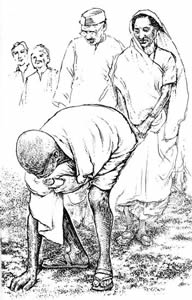
P.O. SEVAGRAM, DIST.WARDHA 442102, MS, INDIA. Phone: 91-7152-284753
FOUNDED BY MAHATMA GANDHI IN 1936
GANDHI PHILOSOPHY : Gandhi's Views
Selections from Gandhiji's writings and speeches to explain his view on various topics.

GANDHI'S VIEWS
On Various subjects
- On India & Violence
- On Sarvodaya (Welfare of All)
- On Theory of Trusteeship
- Gandhi On Nuclear Arms
- Mahatma Gandhi and the Role of the State
- The Inner Voice
Further Reading
(Complete Book available online)
- From Truth Is God
- From The Mind of Mahatma Gandhi
On Myself
- From The Mind of Mahatma Gandhi
On Faith
- From The Mind of Mahatma Gandhi
On Sarvodaya
- From The Mind of Mahatma Gandhi
On Communal Harmony
- From The Mind of Mahatma Gandhi
On Dignity of Labour
- From The Mind of Mahatma Gandhi
On Sarvodaya (Welfare of All)
This article was originally written by Gandhi as a preface to his Gujarati translation of Ruskin's 'Unto This Last'
People in the West generally hold that it is man's duty to promote the happiness - prosperity, that is- of the greatest number. Happiness is taken to mean material happiness exclusively, that is, economic prosperity. If, in the pursuit of this happiness, moral laws are violated, it does not matter much. Again, as the object is the happiness of the greatest number, people in the West do not believe it to be wrong if it is secured at the cost of the minority. The consequences of this attitude are in evidence in all western countries.
The exclusive quest for the physical and material happiness of the majority has no sanction in divine law. In fact, some thoughtful persons in the West have pointed out that it is contrary to divine law to pursue happiness in violation of moral principles. The late John Ruskin was foremost among these. He was an Englishman of great learning. He has written numerous books on art and crafts. He has also written a great deal on ethical questions. One of these books, a small one Ruskin himself believed to be his best. It is read widely wherever English is spoken. In the book, he has effectively countered these arguments and shown that the well-being of the people at large consists in conforming to the moral law.
We in India are much given now-a-days to imitation of the West. We do grant that it is necessary to imitate the West in certain respects. At the same time there is no doubt that many western ideas are wrong. It will be admitted on all hands that what is bad must be eschewed. The condition of Indians in South Africa is pitiable. We go out to distant lands to make money. We are so taken up with this that we become oblivious of morality and of God. We become engrossed in the pursuit of self-interest. In the sequel, we find that going abroad does us more harm than good, or does not profit us as much as it ought to. All religions pre-suppose the moral law, but even if we disregard religion as such, its observance is necessary on grounds of common-sense also. Our happiness consists in observing it. This is what John Ruskin has established. He has opened the eyes of the Western people to this, and today, we see a large number of Europeans modelling their conduct on his teaching. In order that Indians may profit by his ideas, we have decided to present extracts from his book, in a manner intelligible to Indians who do not know English.
Socrates gave us some idea of man's duty. He practised his precepts. It can be argued that Ruskin's ideas are an elaboration of Socrates's. Ruskin has described vividly how one who wants to live by Socrates's ideas should acquit himself in the different vocations. The summary of his work which we offer here is not really a translation. If we translated it, the common reader might be unable to follow some of Biblical allusions, etc. We present therefore only the substance of Ruskin's work. We do not even explain what the title of the book means, for it can be understood only by a person who has read the Bible in English. But since the object which the book works towards is the welfare of all that is, the advancement of all and not merely of the greatest number we have entitled these articles "Sarvodaya".
May 16, 1908